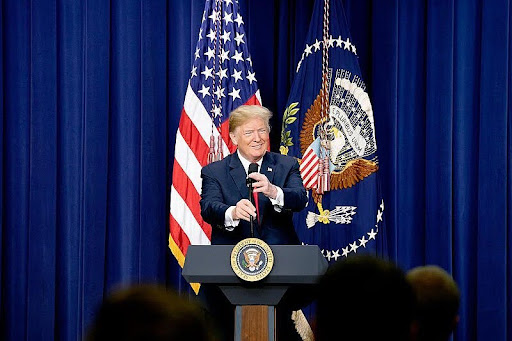On Sunday, Sept. 15, Donald Trump faced a second attempt on his life, this time in West Palm Beach, Fla., by Ryan Wesley Routh.
According to Secret Service agents, Trump was golfing, about to finish the fifth hole, when Routh was found around the perimeter of the course around the sixth hole. An agent inspecting the sixth hole reported seeing a rifle, later identified as an AK-47 assault rifle, pointed towards the golf course with a thin, aging white man behind it.
The agent fired at the suspect, causing him to flee. Routh was seen driving away in a black Nissan, and he was arrested less than an hour later with help from local law enforcement in Martin County.
Routh, 58, who has been charged with attempted assassination, multiple weapons violations and assaulting a federal officer, is a former Greensboro resident. He was convicted in Guilford County for a hit-and-run, possessing stolen property and numerous gun violations.
However, Greensboro residents do not credit this would-be assassin’s actions to his place of birth.
Bryan Fernandes, a student at the Early College at Guilford, said when finding out about Routh’s potentially violent actions and former home that he does “not think that where someone is from has any bearing on their character.”
Guilford College’s Director of Communications, Robert Bell, shares a similar opinion to Fernandes. He expressed interest in Routh residing in Greensboro, but noted that having someone with a criminal history living nearby is merely coincidental.
Another junior at the Early College at Guilford, Momin Khan, viewed Routh’s heritage differently.
“For me, it’s kind of shocking,” he said. Khan feels that living in North Carolina, he hears and can understand a lot of Democratic and Republican views, so to hear a fellow resident go to such an extreme surprised him.
Knox Butka, a second-year at Guilford, is neither shocked nor dismissive that Routh’s home was once Guilford County.
“I think there’s this misconception and preconceived notion about the nature of violence and who perpetrates it,” she said. It may be hard to believe that a potential neighbor could become a national criminal, but, as Butka noticed, this difficult belief may be a “misconception.”
Not everyone is satisfied with the efforts to keep the nation safe from felons like Routh. Fernandes thinks “It’s the fault of the modern criminal justice system that dangerous people, such as him, who have been on record being dangerous, go on not being closely monitored.”
Bell takes a different approach to the situation. He believes that if such a high level of “scrutiny” was applied to everyone “that matches his record” that the Secret Service would be overwhelmed. The Senate has criticized the Secret Service for allowing two assassination attempts within roughly two months, but law enforcement involved in the Florida incident praised the agents for their actions.
With murders attempted so close together, questions were sparked about why multiple people resorted to violence. Some, like Khan, think that Trump is a target because of his controversial and vocal political agenda. Bell acknowledged that both Democrats and Republicans have “political rhetoric” that is “ramped up compared to previous presidential elections.”
Neither Fernandes, Bell nor Khan thinks Routh living in Greensboro will affect the upcoming presidential election. Bell said, “I think the stakes were already pretty high.” The upcoming election is already “ramped up compared to previous presidential elections,” Bell continued; so, he does not believe the potential shooting will impact the race.
Butka took a more cynical view about the lack of effect the assassination attempt seemed to have. “I think people, instead of being rightfully startled about what a political assassination means for the state of our nation…people jump at a chance to either make it a power move or mock it,” she said.
This jump from violence to jokes or “power moves” may reflect a bigger problem. Butka said, “the signs of our crippling democracy and national fracturing are perhaps weighing on us more than we let on.” She thinks a lot of people at Guilford College share her view.
Routh took an unconventional approach to solving what he saw, which he outlined in his letter addressed to “The World,” as a politician that would hurt America, though his core message may not be as dangerous as his actions. His approach, though extreme and not inherently correct, reflects, according to Fernandes, a theme the country was founded on: if the government is unjust the people have the right to change it.
The right to vote is not used by every U.S. citizen, voter turnout is almost none in some North Carolina cities, and Bell agrees that “Americans should take part, a bigger part, in their political elections, but obviously not to the extent of Routh.”







